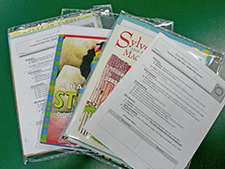 As they settled into the day’s tutoring session, Edward, a third grader in Denver, and his tutor, Mr. Harlon, discussed their shared love of football–watching the Broncos for Mr. Harlon and playing after school for Edward. Now they are deep in conversation about the book Pet Show by Ezra Jack Keats. After reading aloud about Archie’s independent-minded cat, who has gone missing right before the neighborhood pet show, Mr. Harlon pauses to say, “Independent is a good word for you to learn, Edward. It means that you aren’t controlled by anyone, or you don’t need anyone’s help. It sounds like Archie’s cat went off on his own because he doesn’t need anyone’s help.” After a quick brainstorm about all the things an independent cat would manage on his own—“Finding food!” Edward chimed in— the pair wrote down the word independent to review again later, and continued reading.
As they settled into the day’s tutoring session, Edward, a third grader in Denver, and his tutor, Mr. Harlon, discussed their shared love of football–watching the Broncos for Mr. Harlon and playing after school for Edward. Now they are deep in conversation about the book Pet Show by Ezra Jack Keats. After reading aloud about Archie’s independent-minded cat, who has gone missing right before the neighborhood pet show, Mr. Harlon pauses to say, “Independent is a good word for you to learn, Edward. It means that you aren’t controlled by anyone, or you don’t need anyone’s help. It sounds like Archie’s cat went off on his own because he doesn’t need anyone’s help.” After a quick brainstorm about all the things an independent cat would manage on his own—“Finding food!” Edward chimed in— the pair wrote down the word independent to review again later, and continued reading.
Words like independent are exactly the types of words that the Common Core State Standards (CCSS) emphasize as important for students to learn—words that are common in literary language and applicable to a variety of contexts. When Reading Partners launched its 2013-14 program year this fall, it did so in reading centers stocked with curriculum materials updated to reflect the CCSS, a set of learning standards for each grade level written by national education experts and intended to communicate clear expectations for what students need to learn. The standards are billed as “robust and relevant to the real world, reflecting the knowledge and skills that our young people need for success in college and careers.”
Why did Reading Partners decide to update its curriculum to better align to the Common Core?
First, the CCSS have been adopted by 45 states and the District of Columbia. Aligning our curriculum to the standards used by so many of our schools means that we can provide instruction that supports students’ work in their classrooms from California to New York. Second, Reading Partners believes in the goals of the Common Core. We also aim to help children become lifelong readers prepared for college and meaningful careers. We view reading as the gateway skill to ensuring student success in other subject areas and believe that reading proficiently in elementary school greatly affects a student’s likelihood of graduating from high school instead of dropping out early. Finally, Reading Partners updated its curriculum to align with the CCSS because there is significant evidence on which the standards are based and we want to ensure that our curriculum and instructional resources are aligned with strong evidence.
Reading for Comprehension
Besides an intensified focus on building students’ vocabularies, Reading Partners has responded to the CCSS by increasing its emphasis on teaching students to read carefully and reflect thoughtfully about what they read. New “Core Read Aloud Guides” and updated lesson plans for grades 2-4 provide prompts and questions for tutors to use to support student comprehension. “What do you think the judges are whispering about?” Mr. Harlon asks Edward after finishing the page on which Archie presents his stand-in pet, a “germ” in a jar. “They are probably talking about whether the germ is real,” Edward replies.
Informational Texts
In addition to reading stories carefully, the Common Core highlights the need for students to hone skills for comprehending informational text, pointing out that reading about science and social studies topics gives students “the background to be better readers in all content areas.” Reading Partners has significantly increased the role of informational text in its lessons this year. Perhaps in their next session, Edward and Mr. Harlon will read and discuss the nonfiction book Why Do Cats Meow? by Joan Holub to gain some more insight into the behavior of Archie’s elusive cat.
 The Common Core has sparked a thought-provoking debate about what’s best for students. In a recent statement on implementing the Common Core, The International Reading Association (IRA) urges the education world to take time to thoughtfully transition to the standards. At the IRA Convention in April, members of the group’s Literacy Research Panel, some of whom were involved with the writing of the CCSS themselves, emphasized that more research will be needed to refine the standards over time. As part of its commitment to evidence-based, cutting-edge instruction, Reading Partners will be following the ongoing conversation carefully.
The Common Core has sparked a thought-provoking debate about what’s best for students. In a recent statement on implementing the Common Core, The International Reading Association (IRA) urges the education world to take time to thoughtfully transition to the standards. At the IRA Convention in April, members of the group’s Literacy Research Panel, some of whom were involved with the writing of the CCSS themselves, emphasized that more research will be needed to refine the standards over time. As part of its commitment to evidence-based, cutting-edge instruction, Reading Partners will be following the ongoing conversation carefully.
Look for more blog posts this year on curriculum updates and the Common Core as Reading Partners continues its mission to empower students by providing targeted literacy instruction to struggling readers. As for Edward, Denver staff are happy to report that he is becoming a more independent reader with every tutoring session.
Reading Partners worked with a curriculum expert advisory panel and consultants to plan and execute curriculum updates for the 2013-14 program year. Questions about our curriculum can be directed to Director of Program Development Lindsay Barrett at lindsay.barrett [at] readingpartners [dot] org.



